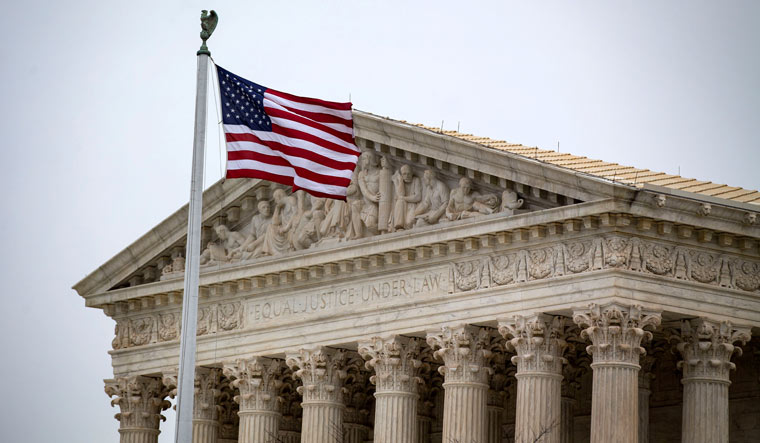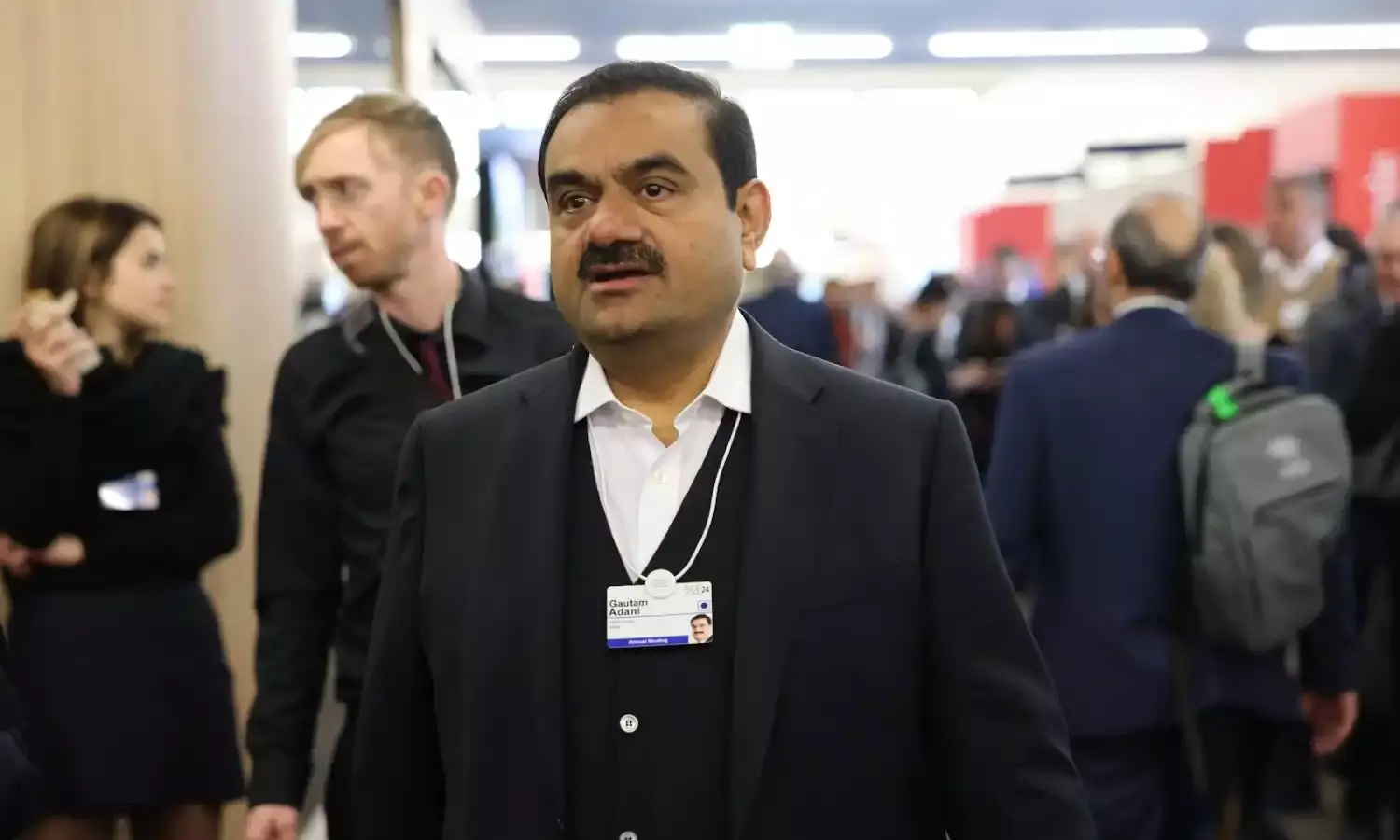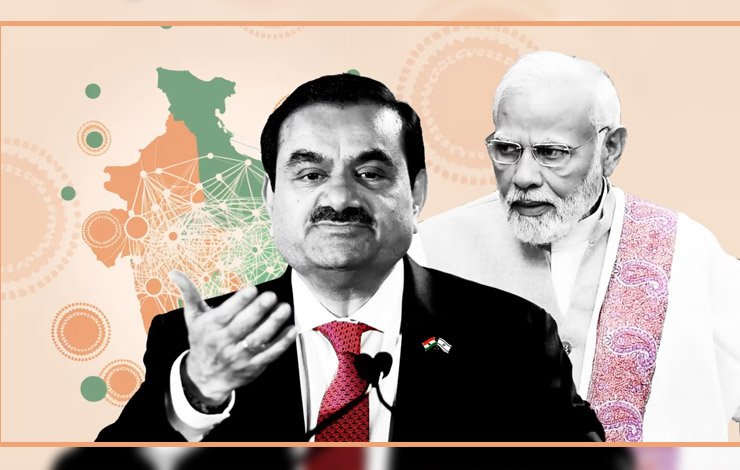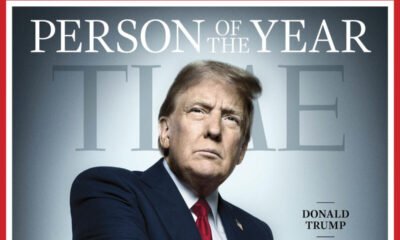Trends
Why U.S. Courts Are Involved In The Alleged Adani Fraud Case. The Questions, Will Adani Bounce Back, Why Is The Modi Govt Quiet And What About India’s Reputation?
Published
1 year agoon

When allegations of fraud against a conglomerate as vast as the Adani Group surface, their ripples extend far beyond national borders. While the accusations may have originated in India, they’ve inevitably drawn the attention of U.S. courts and investors.
The question on many minds is—why? If the alleged irregularities occurred in India, what role does the United States play in adjudicating such cases?
Well, simply the answer lies in the global nature of modern finance.
The Role of U.S.-Based Investors
The Adani Group isn’t just an Indian entity; it’s a global player with ties to international investors, including many based in the United States. Large institutional investors, pension funds, and even individual shareholders in the U.S. have exposure to Adani’s financial instruments, either directly or through global funds.
Thus, if fraud or misrepresentation impacts their financial interests, U.S. securities laws provide them a legal pathway to seek redress. This makes U.S. courts an attractive venue for pursuing justice, especially given their strong mechanisms for handling securities-related disputes.
International Financial Instruments and U.S. Jurisdiction
Again, Adani’s financial footprint isn’t limited to the Bombay Stock Exchange or the National Stock Exchange of India. The group has issued bonds and financial instruments that are accessible to U.S.-based investors, often through mechanisms like American Depository Receipts (ADRs) or international bond offerings.
These instruments fall under the purview of U.S. securities regulations, therefore, any material misrepresentation in their disclosure or reporting can lead to legal action under the jurisdiction of U.S. courts.
What is the power of Class Action Lawsuits?
One of the most significant drivers of U.S. court involvement is the country’s unique legal system, which allows for class action lawsuits. Such lawsuits enable a group of investors, harmed by the same alleged wrongdoing, to band together and sue collectively. Following the allegations outlined in the Hindenburg report, several reports emerged suggesting that U.S.-based investors were exploring this legal option.
If that happens, the outcome could force Adani or its representatives to respond in U.S. courts, even if the alleged misconduct occurred elsewhere.

Cross-Border Fraud and U.S. Legal Frameworks
The United States has long maintained stringent laws to address cross-border fraud, including the Foreign Corrupt Practices Act (FCPA) and the Securities Exchange Act.
If the Adani Group’s activities are found to violate these laws—whether through corruption, fraudulent reporting, or misleading statements—U.S. regulators like the Securities and Exchange Commission (SEC) or the Department of Justice (DOJ) can initiate investigations and legal actions. These laws are designed to protect U.S. investors and uphold transparency in global financial systems.
This directly leads us to the global implications of local allegations.
Adani’s operations span continents, with businesses and financial relationships in multiple countries, including the United States. This international presence means that any allegations of fraud are unlikely to remain confined to India. The interconnectedness of global finance ensures that companies with cross-border exposure are held accountable on a global stage.
U.S. courts, with their reputation for impartiality and investor protection, naturally become a focal point for such cases.
What This Means for Global Corporations
Allegations of wrongdoing in one country can lead to legal and financial consequences in others. For global corporations, this cements the importance of transparency, compliance with international norms, and accurate disclosures.
If one were to look at such examples, there are several precedents where alleged fraud or misconduct by non-U.S. companies drew the involvement of U.S. courts due to their global financial ties and U.S.-based investors.
Some of the high profile cases in point are from companies from all over the world –
1. Volkswagen Emissions Scandal (“Dieselgate”)
What Happened: In 2015, Volkswagen was found to have installed software in millions of diesel vehicles to cheat emissions tests. Although the misconduct primarily occurred in Europe, it impacted vehicles sold in the U.S.
U.S. Involvement: The U.S. Environmental Protection Agency (EPA) and the Department of Justice (DOJ) took legal action because the company violated U.S. environmental laws. Volkswagen faced class-action lawsuits from U.S. car owners who claimed they were misled.
Outcome: Volkswagen paid over $25 billion in fines, compensation, and buyback costs in the U.S. alone.
2. Petrobras Corruption Scandal (Operation Car Wash)
What Happened: The Brazilian oil giant was implicated in a massive corruption scheme involving bribes and kickbacks linked to government contracts.
U.S. Involvement: Petrobras had securities listed on the New York Stock Exchange (NYSE), bringing it under the jurisdiction of U.S. securities laws. U.S.-based investors filed class-action lawsuits, claiming they were misled by the company’s false financial disclosures.
Outcome: Petrobras agreed to a $2.95 billion settlement with U.S. investors in 2018, one of the largest securities fraud settlements in U.S. history.
3. Wirecard AG Accounting Fraud
What Happened: German fintech company Wirecard collapsed in 2020 after admitting that €1.9 billion in cash was missing from its accounts, exposing one of Europe’s largest corporate frauds.
U.S. Involvement: Although Wirecard was based in Germany, it had operations in the U.S. and its misconduct impacted American investors.
U.S.-based funds and investors launched lawsuits alleging they were misled by Wirecard’s financial statements.
Outcome: Investigations in the U.S. are ongoing, but the fallout highlighted the global ramifications of corporate fraud.
4. Luckin Coffee Scandal
What Happened: Chinese coffee chain Luckin Coffee was accused of fabricating $300 million in revenue in 2019-2020.
U.S. Involvement: The company was listed on the NASDAQ, giving U.S. regulators jurisdiction. The SEC charged Luckin Coffee with defrauding investors, leading to a settlement where the company agreed to pay a $180 million penalty.
Outcome: Luckin Coffee was delisted from NASDAQ but continued operations after restructuring.
5. Toshiba Accounting Scandal
What Happened: In 2015, Toshiba admitted to inflating profits by nearly $2 billion over several years.
U.S. Involvement: Toshiba had bonds and securities accessible to U.S. investors. U.S.-based investors filed class-action lawsuits, claiming the company’s financial irregularities caused significant losses.
Outcome: Toshiba faced regulatory scrutiny in Japan and lawsuits in the U.S., resulting in financial penalties and settlements.
These examples show how companies with international financial footprints are held accountable globally. U.S. courts and regulators, particularly the SEC, often play a significant role in ensuring justice when:
–U.S. investors suffer losses.
–Fraudulent practices violate U.S. laws or regulations.
–The company is listed on a U.S. stock exchange or has issued bonds accessible to U.S. markets.

Will Adani Bounce Back
The question on everyone’s lips is whether Gautam Adani can outmanoeuvre yet again and bounce back, the answer as per analysts is that tycoon has the resilience to recover, still this time, it might not be that easy.
The bombshell indictment in New York on Wednesday accused Adani and his associates of paying over $250 million in bribes to secure lucrative government contracts.
The news triggered a sharp sell-off in Adani Group stocks, with opposition leader Rahul Gandhi (ironic since it involves a congress leader as well) demanding Adani’s arrest and Kenyan President William Ruto cancelling airport and electricity deals worth $2.5 billion.
While the Adani Group dismissed the bribery charges as “baseless,” the implications are significant. Shriram Subramanian, founder of InGovern Research Services, a corporate governance advisory firm, called it a major blow.
“They will likely defend themselves through appeals or seek a settlement,” Subramanian stated. “But this severely dents their reputation and raises questions about their corporate governance practices.”
Bigger Than Hindenburg?
Gautam Adani’s meteoric rise—from a port operator to the world’s second-richest man—has had its fair share of controversies and allegations of undue advantage due to his proximity to Indian Prime Minister Narendra Modi.
The conglomerate previously survived a major scandal in 2023, when a report by U.S. short-seller Hindenburg Research accused it of “brazen” corporate fraud, wiping out $150 billion in market value.
Despite that, Adani managed to regain investor confidence.
“Given his clout, resources, and access, he has the capacity to bounce back—we saw that last time,” Michael Kugelman, Director of the South Asia Institute at The Wilson Center, stated. However, Kugelman warns that the current challenge is “unprecedented.” “Being indicted by the U.S. justice system is on a completely different scale,” he said. “Hindenburg pales in comparison to what Adani is facing now.”
Global Fallout
Adani’s business empire spans coal, airports, cement, and media, with operations in countries like Australia, Bangladesh, Israel, Sri Lanka, and Tanzania. The bribery allegations are already having ripple effects, with key investors reevaluating their positions and grassroots opposition growing against Adani’s projects.
In Sri Lanka, activists are demanding the suspension of a $442 million wind power project by Adani Green Energy, citing concerns over the conglomerate’s reputation.
“The tolerance for risk among investors who supported him during the Hindenburg saga is much lower now,” Kugelman said.
Slow Down In The Offing
Adani Group, is India’s largest private port operator and a major player in airports and energy, and this latest crises has the potential to slow its meteoric rise. The conglomerate operates key infrastructure, including Mumbai and Ahmedabad airports, and is heavily invested in coal and renewable energy across the world’s fifth-largest economy.
In October, Sagar Adani, nephew of Gautam Adani and a board member, denied any political ties between the conglomerate and Prime Minister Narendra Modi’s government, dismissing claims of favoritism. However, analysts like Hemindra Hazari suggest that the group’s rise was supported by perceptions of its closeness to the ruling dispensation.
“Most investors backed Adani despite its limited managerial experience because it seemed to enjoy exceptionally favorable terms—unusual in any normal market-based economy,” Hazari stated.
A significant portion of Adani’s debt is foreign-funded, and Hazari predicts that “everything will slow down for them for now,” as international scrutiny grows.

India’s Reputation at Risk
The Indian government has yet to comment on the allegations, but opposition leader Rahul Gandhi has called for Adani’s arrest. He also alleged that Modi’s government is shielding the conglomerate. The BJP, in turn, claimed the bribery allegations are linked to opposition-led state governments, deflecting criticism from the ruling party.
Shriram Subramanian of InGovern Research Services downplayed the long-term impact, calling it a mere “dent” to Adani’s reputation. He believes the group will continue pursuing projects in India and abroad.
However, Michael Kugelman, Director of the South Asia Institute at The Wilson Center, warned that the “reputational blows” could harm not just the Adani Group but India’s image globally. While he doesn’t foresee a major impact on India-U.S. relations, he speculates that the incoming U.S. President Donald Trump might leverage the issue for strategic gains, potentially seeking concessions on trade policies.
Adani’s Response
In a detailed statement, Adani Group’s CFO, Jugeshinder Robbie Singh, clarified that the U.S. bribery indictment pertains to a single contract under Adani Green Energy, which constitutes about 10% of the group’s business. Singh emphasized that none of the other 11 publicly listed Adani companies are implicated in the DOJ filings.
The group has committed to reviewing the allegations and providing a comprehensive response after consulting legal counsel. Singh also reminded stakeholders that the allegations remain unproven and urged caution against sensationalized media reports.
The fallout has been swift. Shares in Adani entities have taken a hit, reflecting growing concerns about the group’s financial stability. Reports indicate that some global banks are reconsidering their exposure to Adani, with suggestions of a temporary halt on fresh credit. In Kenya, the government has canceled two major deals worth over $2.5 billion, a blow to the conglomerate’s international expansion.
Adding to the complications, the indictment accuses Sagar Adani of monitoring alleged bribes worth hundreds of millions of dollars via his mobile phone. These allegations raise serious questions over the group’s leadership and future prospects.
The Last Bit
Adani Group’s reputation as a global infrastructure giant is definatly not looking that rosy.
While the conglomerate has weathered previous controversies, including the Hindenburg Research report in 2023, this latest challenge is of a different magnitude
Adani faces a battle on multiple fronts—legal, financial, and reputational. The bribery allegations, coupled with political and grassroots opposition, pose significant hurdles for the conglomerate.
Yet, if history is any indicator, Adani’s ability to leverage his vast resources and connections might help him overcome the crises.
The involvement of U.S. courts in the Adani fraud case isn’t an overreach; it’s a reflection of the globalized financial dynamics in which we operate.
For companies like Adani Group, the lesson is – globalization demands impeccable corporate governance and adherence to cross-border regulations. Missteps in one jurisdiction can lead to far-reaching consequences.
For India this is a major embarrassment.
You may like
-


Taiwan’s ‘Historic’ TSMC Deal, A Win Or The End Of Its ‘Silicon Shield’ As China Threatens? A Jittery Taiwan Watches Trump’s Moves On Ukraine, Wondering, Could We Be Next?
-


America And China’s Thirst For Gold In 2025 Is Draining Other Countries’ Reserves; Here’s Why?
-


Is Ukraine Now Stuck In The US-Russia Ecosystem? Could Zelensky Have Made A Deal To Stop The War, Is Trump Right?
-


Why Are Japanese Companies Not Happy With Trump? How Trump 2.0 Is Shaking The World Into A ‘Rude’ Awakening?
-


Adani $265 Million Bribery Scandal Comes Under Spotlight Again. US SEC Seeks India’s Help, Stocks Trade Mixed—Modi’s Dilemma, Protect Or Distance?
-


Delta Airline Crash, It Flipped On Its Roof! A String Of Plane Crashes In 2025. What’s Happening?
